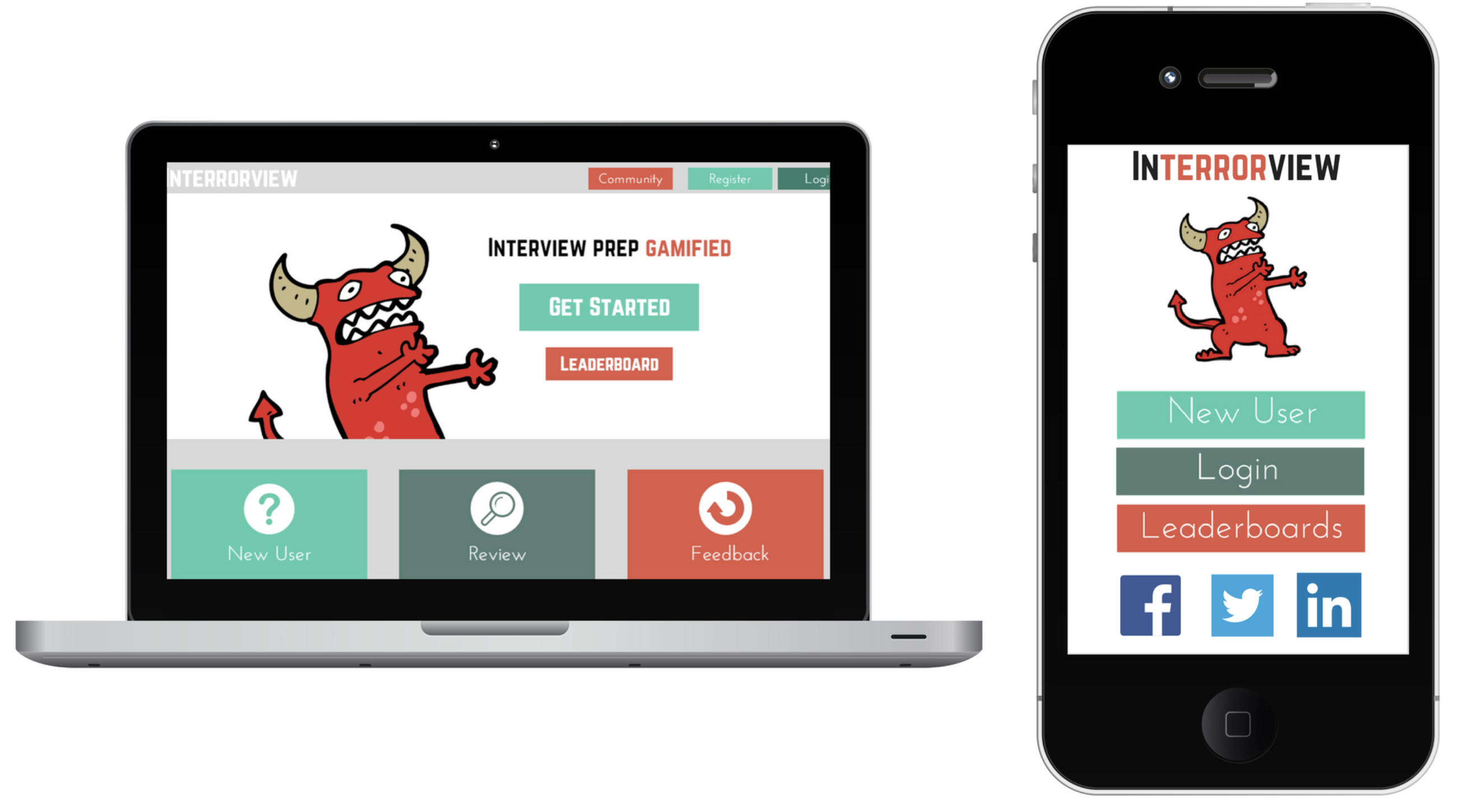Interrorview
- Start-up Weekend Project
- 2016

Problem
Our team originally formed to solve a problem facing anyone who has done public speaking gigs - it’s difficult to get honest, timely feedback on your performance. We envisioned an app that would allow audience members to give feedback to speakers as they were presenting. The entire team had given talks in the past and felt unsatisfied with the type of feedback available to us, and were interested in designing a tool that would give us and other speakers information that we could use to improve our public speaking skills.
Myself and another teammate interviewed about a dozen potential users to validate our idea. Our interview pool consisted of people who regularly give speeches or talks as part of their job, hobby, or educational career. It was clear from this first set of user research that our plan was a poor one. People hated the idea of audience members paying attention to their phone as they rated the speaker, rather than actually paying attention to the speaker during their presentation. There was clearly not an interest or a market for this type of solution.
With that knowledge, we quickly pivoted and entertained several possible apps focused on speech preparation and coaching. After some initial market analysis, we realized that our target market (those that gives speeches), was rather small and that these app ideas did not carry high business potential.
Thirty-six hours into the 48-hour challenge, we pivoted again. Although our original ideas fell through, there are other sizable markets that are interested in coaching and feedback solutions for high pressure situations. One of the highest pressure situations we had all experienced were interviews. In an interview, the stakes are high, with a similarly high incentive to prepare well. Yet the tools to do so are virtually nonexistent. An interviewee has to rely on possibly outdated, poorly organized forums and opportunistic Google searches. The probability of finding high quality resources for tough interview question prep is frustratingly low. Add in the fact that preparing for interviews can be incredibly isolating if you don’t know where to turn for advice. We felt this was a problem that would resonate with many people.
Artifacts
- Brainstorming and desgin sprints
- User research
- Market analysis
- Business model
- High-fidelity prototype
- Pitch session
User research
Knowing that there are a wide range of interview question categories and the type of interview you experience varies greatly on career path and field, we decided to focus on one style of interview question - the behavioral question. These are the types of questions that ask you to “give an example of a time you did xyz” or “what would you do in abc scenario?”. The sorts of questions that are easy to answer poorly, and hard to answer correctly.
We developed two hypotheses:
- behavioral questions are a true pain point for our potential users
- and a fun experience with supportive feedback would provide a better learning environment for interview preparation
Again, myself and my teammate were responsible for validating our hypotheses. Of the 20 potential users we interviewed, 95% had experienced a behavioral interview question, and felt that they were not equipped to prepare for that style of question. Most prepared for these types of questions by practicing in front of a mirror, but they felt that this was not the most effective strategy. About 80% stated they did not feel prepared. Our potential users also believed that positive feedback and a good support community would have made the preparation process much less intimidating.
Market Analysis
With our hypotheses validated, we moved on to our market analysis. Based on US Bureau of Labor Statistics numbers, 140,000-180,000 new jobs were added each month of 2016. Each job opening generates 10-20 phone interviews and 3-5 in person interviews. Factoring in-person interviews alone, that gave us a potential minimum market of 420,000. Assuming our MVP could capture just 1% of that market, we felt we could reasonably estimate a potential user base of 4,200 customers per month.
Business modelOur solution is intended as a web-based app that operates under a freemium model. We offer a free version of the app with limited features, but for a quarterly subscription plan a user would have access to a suite of feedback tools and analysis, and a full range of behavioral questions from which they could practice.

Prototype
A customer interacting with our MVP would be able to do several things:
- practice individual behavioral interview questions and record their answers
- receive feedback on the quality of their answer
- gain points based on the difficulty of the question and the quality of their answer
- see how their answers stack up against other community members’
I created an interactive MVP demo using Invision.
Results
Start-up Weekend events are intense by design. The quick turnaround time necessary for every step of the process makes it stressful, but it also forces you and your team to pivot quickly, iterate aggressively, and focus on creating an absolutely minimal viable product. Each time we pivoted from our original design was an incredible learning experience. The process forced us to confront the realities that our potential solutions were not attractive or useful to our users early on, and we became intimately and infuriatingly familiar with failing fast. We failed well enough to recover each time we pivoted. As a result, we designed a start-up idea that resonated with the audience and panel judges, earning ourselves third place!